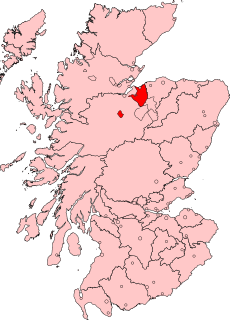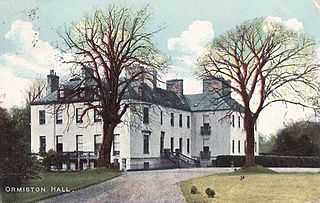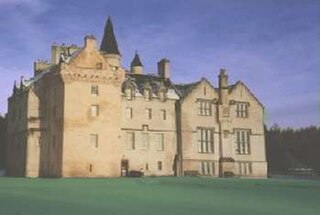Related Research Articles
William Grant, Lord Prestongrange, was a Scottish politician and judge.
The Lord Lieutenant of Nairn, is the British monarch's personal representative in an area which has been defined since 1975 as consisting of the local government district of Nairn, in Scotland, and this definition was renewed by the Lord-Lieutenants (Scotland) Order 1996. Previously, the area of the lieutenancy was the county of Nairn, which was abolished as a local government area by the Local Government (Scotland) Act 1973. The district was created, under the 1973 act, with the boundaries of the county, as a district of the two-tier Highland region and abolished as a local government area under the Local Government (Scotland) Act 1994, which turned the Highland region into a unitary council area.

Brodie can be a given name or a surname of Scottish origin, and a location in Moray, Scotland, its meaning is uncertain; it is not clear if Brodie, as a word, has its origins in the Gaelic or Pictish languages. In 2012 this name was the 53rd most popular boys' name in Scotland. The given name can be a male or female name, originating from the surname.

Clan Brodie is a Scottish clan whose origins are uncertain. The first known Brodie chiefs were the Thanes of Brodie and Dyke in Morayshire. The Brodies were present in several clan conflicts, and during the civil war were ardent covenanters. They resisted involvement in the Jacobite uprisings, and the chief's family later prospered under the British Empire in colonial India.

Nairnshire was a county constituency of the House of Commons of Great Britain from 1708 until 1800, and of the House of Commons of the United Kingdom from 1801 to 1832.
William Dalrymple was a Scottish Whig politician who sat in the Parliament of Scotland from 1702 to 1707 and in the British House of Commons between 1707 and 1741.

John Cockburn of Ormiston, East Lothian, was a Scottish landowner and politician who sat in the Parliament of Scotland from 1702 to 1707 and as a Whig in the British House of Commons for 34 years from 1707 to 1741.

Sir David Dalrymple, 1st Baronet, of Hailes was a Scottish advocate and politician who sat in the Parliament of Scotland from 1698 to 1707 and in the British House of Commons from 1707 to 1721. He served as Lord Advocate, and eventually Auditor of the Exchequer in Scotland in 1720.
Alexander Brodie may refer to:
Peter Ewen Brodie OBE QPM was a British police officer.
John Campbell of Stackpole Court and Cawdor (1695–1777), was a British politician. He was a Member of Parliament (MP) for Pembrokeshire, Nairnshire, Inverness Burghs and Corfe Castle.
Nairnshire was a constituency of the Parliament of Scotland before the Union with England in 1707. The barons of the shire or sheriffdom of Nairn elected two commissioners to represent them in the Parliament and in the Convention of Estates.

Pryse Campbell, was a Scottish politician. He was the Member of Parliament (MP) for Cardigan Boroughs, Inverness-shire and Nairnshire.
Thomas Dundas of Fingask and Carronhall, Stirlingshire was a Scottish merchant and politician.
George Brodie of Ailisk was a Scottish politician.

James Brodie, 18th of Brodie was a Scottish clan chief and politician who sat in the House of Commons in 1720.
James Brodie was a Scottish politician.

Alexander Brodie, 19th of that Ilk was a Scottish clan chief and politician from Moray. He sat in the House of Commons of Great Britain for 34 years from 1720 to 1754, as a government supporter. For 27 years he was Lord Lyon King of Arms, the most junior of the Scottish Great Officers of State, responsible for regulating the heraldry of Scotland.
Alexander Abercromby of Glassaugh, Fordyce, Banffshire was a Scottish Army officer and politician who sat in the Parliament of Scotland from 1706 to 1707 and as a Whig in the British House of Commons from 1707 to 1727.
Alexander Grant of Castle Grant, Elgin, was a Scottish politician who sat in the Parliament of Scotland from 1702 to 1707 and as a Whig in the British House of Commons from 1707 to 1719.
References
- 1 2 Leigh Rayment's Historical List of MPs – Constituencies beginning with "C" (part 6)
- 1 2 Foster, Joseph (1882). Members of Parliament, Scotland, including the minor barons, the commissioners for the shires, and the commissioners for the burghs, 1357–1882: on the basis of the parliamentary return 1880, with genealogical and biographical notices (2nd ed.). pp. 34–5. OL 17326078M . Retrieved 29 April 2015– via Open Library.
- 1 2 Watson, Paula (1970). R. Sedgwick (ed.). "BRODIE, Alexander (d.1770), of Lethen, Nairnshire". The History of Parliament: the House of Commons 1715-1754. Boydell and Brewer. Retrieved 30 April 2015.
| Parliament of Great Britain | ||
|---|---|---|
| Preceded by John Campbell | Member of Parliament for Nairnshire 1735–1741 | Vacant alternating constituency with Elginshire Title next held by John Campbell from 1747 |
| | This article about a Member of the Parliament of Great Britain (1707–1800) representing a Scottish constituency is a stub. You can help Wikipedia by expanding it. |